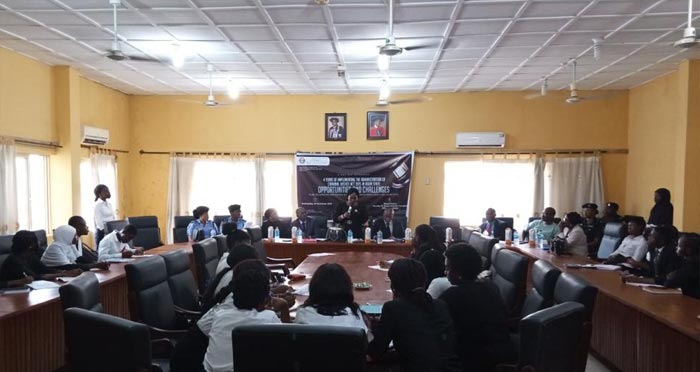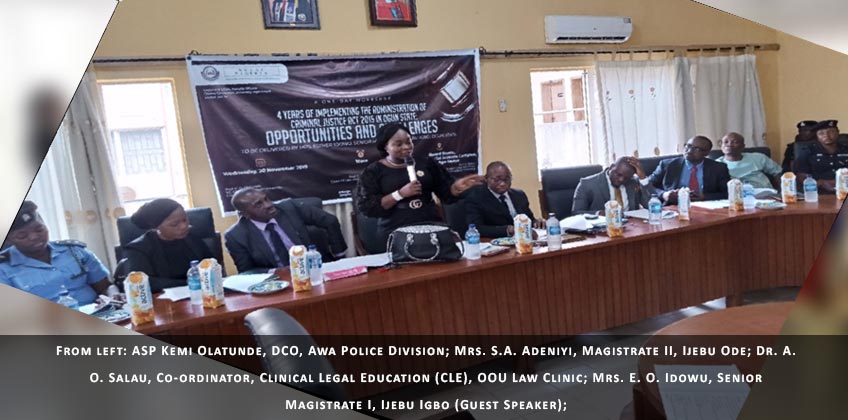The Law Clinic of the Faculty of Law, Olabisi Onabanjo University, Ago-Iwoye, has just concluded a Workshop on “Four Years of Implementing the Administration of Criminal Justice Act 2015 in Ogun State: Opportunities and Challenges”. The event which took place on Wednesday, 20th November, 2019 at the Faculty of Social Sciences, Board Room, Main Campus of the University was sponsored by the Network of Universities Legal Aid, Institution (NULAI) and Open Society Institute, West Africa (OSIWA)
According to the Coordinator, Olabisi Onabanjo University Law Clinic, Dr. Olaniyi Salau the main purpose of the Workshop was to bring together all stakeholders in the administration of Criminal Justice in Nigeria on the way forward in implementing the administration of Criminal Justice Act of Nigeria 2015 and its Ogun State version. He added that the Workshop also aimed to discuss and analyze the administration of criminal justice law of Ogun State 2017 towards facilitating access to justice for pre-trial or awaiting trial detainees in Ogun State.
In addition to the above, Dr. Salau stated further that the Workshop was organized to create awareness among members of the University Community, the host community of Ago-Iwoye, law enforcement agencies and the general public. He said that this awareness would ensure that all and sundry are aware of their rights and how to protect such rights.

Declaring the Workshop opened, the Vice-Chancellor, Olabisi Onabanjo University, Professor Ganiyu Olatunji Olatunde ably represented by Dr. Adebambo Oduwole commended the Law Clinic for organizing the Workshop and for bringing up the new laws which “many of us are not aware of”. The Vice-Chancellor assured members of the Faculty of Law and those attending the Workshop that the University had put all resources together to ensure that the Law Faculty retains its accreditation status during the next NUC accreditation exercise. The Vice-Chancellor emphasized that Management would continue to render supports to all the Faculties in the University and provide the necessary facilities that would create an enviable teaching and learning environment.
Professor Olatunde declared that the University would leave no stone unturned in ensuring that lives and property of members of the University Community are safe. According to him, “it is when your environment is safe that teaching and learning can take place”. He advised the students to be law abiding and be a role model to other student on Campus.
The Vice-Chancellor said he was proud of the quality of students that were graduating from the Faculty Law. He cited the sterling performances of four of its graduates who made a first class at the recently concluded 2019 Bar Examinations of the Nigerian Law School. He charged the entire law students not to rest on their oars and to see the Law Clinic as an avenue to hone their practical skills before graduation.
Also speaking at the event, the Dean, Faculty of Law, Professor Charles Adekoya thanked the Vice-Chancellor for the support given to the OOU Law Clinic and the entire Faculty of Law. He acknowledged that since the establishment of the Law Clinic some years ago, the clinic had been benefiting from grants to enable it embark on awareness campaigns and perform other sundry legal matters to the benefit of the society.
Professor Adekoya urged the Law Clinic to be more committed in its activities. He advised its leaders to ensure that copies of the new laws are made available to different departments /units in the University.
The Guest Speaker, Senior Magistrate, E. O. Idowu, in her paper entitled, “Four Years of Implementing The Administration of Criminal Justice Act 2015 In Ogun State: Opportunities And Challenges”, said that the Administration of Criminal Justice Act 2015 (ACJA 2015) has been domesticated into the Administration of Criminal Justice and other Related Matters Law of Ogun State (ACJL 2017).
She remarked further that “the law, which has a commencement date of 29th May 2018, deliberately set out to transform the criminal justice system within the state from its present state of retributive justice into a restorative justice system”.
Senior Magistrate Idowu also noted that the Ogun State Law addressed wide range of issues and guaranteed the following among others: the right of a person arrested by the police to be informed immediately of the reason for the arrest, the right of a person accused of criminal offence not to make a confessional statement at the police station without the presence of his/her lawyer or any person such a person wishes to be in attendance, the right to remain silent or avoid answering any question until after consultation with a legal practitioner or any other person of his choice and the right of a person arrested to consult a legal practitioner of his choice before making, endorsing or writing any statement or answering any question put to him after the arrest. Others include, the right of an arrested person to remain silent and refuse to answer any question or make or endorse any statement at the police station, the right of a woman to stand as surety for bail of an accused person and not to be discriminated against on the ground that the person was a woman. The Guest Speaker also revealed that the law also made it mandatory for any authority having custody of the suspect would have the responsibility of notifying the next of kin or relative of the suspect of the arrest at no cost to the suspect.
Delivering his own paper entitled, “Law Clinic, Clinical Legal Education and Administration of Criminal Justice in Nigeria”, the Coordinator, Clinical Legal Education, Dr. A. O. Salau of the Faculty of Law, OOU, delved into the genesis of Law Clinics in Nigeria. He recalled that its establishment was part of the clinical legal education methodology which had been inculcated into academic legal training of Law Faculties in Nigeria.
According to him, the Network of Universities Legal Aid Institution (NULAI) set up in 2003, to promote Clinical Legal Education, Legal Aid and access to justice in Nigeria introduced and institutionalized “Clinical Legal Education” in Nigeria.
Dr. Salau stated that a curriculum which made Clinical Legal Education compulsory for all Law Faculties in Nigeria to have a Law Clinic and to adopt a Clinical Legal Education as a course had been adopted by the Nigerian Universities Commission in its guidelines for minimum standard for Law Faculties in Nigeria and “it was also encompassed in the accreditation guidelines for the Council of Legal Education”.
He explained that Clinical Legal Education was a learning method which focused on enabling students to understand how the law works in action. Dr. Salau disclosed that it was a practical approach to legal studies whereby law students are exposed to simulated and real live cases and clients, and as such, the trainees could think, conduct his/herself and perform as lawyers.
He emphasized that the essence of these clinical training by NULAI and Law Faculties was the need to expose prospective lawyers to an on-the-job training ahead of their prospective legal careers and inculcate in them skills, values and competences as prospective lawyers.
Making reference to OOU, Dr. Salau disclosed that the OOU Law Clinic has been attending to live cases from members of the University Community and the public. He stated further that the Law Clinic played a mediatory role most of the time when dealing with civil cases.
On the administration of criminal justice in Nigeria, the Coordinator was of the view that the Law clinic played a vital role in criminal matters with respect to pre-trial or awaiting trial detainees.
Speaking further on Nigeria’s Administration of General Justice Act of 2015 ACJA 2015), Dr. Salau was of the view that the law had gone a long way to prevent arbitrary arrests, decongest the prisons, safeguard the rights of pre-trial detainees and generally advance citizen’s rights as required by international human rights norms.
Dr. Salau, thereafter revealed that the OOU Law Clinic was currently implementing a project on access to justice for pre-trial detainees at Ijebu-Ode and Shagamu Correctional Centres in Ogun State.
In his closing remarks, the Vice-Chancellor, Professor Ganiyu Olatunde commended the organizers, the Guest Speaker and other participants for a job well done. He implored the Law Clinic to extend the knowledge of the law and the communique of the Workshop to members of the University Community considering the importance of issues discussed in relation to our daily activities.


